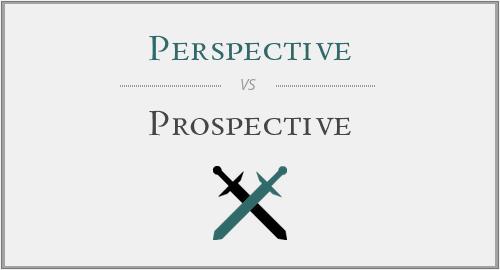Perspective” and “prospective” constitute a great example of paronyms. The two words have very similar spellings, that are written and pronounced with a high degree of similitude, but which have different lexical meanings and grammatical functions, referring to completely different concepts.
If you are not familiar with the significations of these words and want to get a better understanding of how to correctly use “perspective” and “prospective”, then this article will be perfect for you. We are going to explain to you the differences between “perspective” and “prospective”, along with some great examples of how to use them in sentences with the proper lexical signification.
Perspective vs. Prospective
First of all, the major difference between this pair of words is represented by their grammatical functions. “Perspective” is a noun, whereas “prospective” is an adjective. There is no case where these words play another role or are used as a different part of speech, so this is a first essential reason why they should never be confounded and used instead of the other.
Secondly, let’s talk a little about their lexical meanings. “Perspective” defines a concept, a way of thinking, while “prospective” describes something that might happen, something that is possible but not certain. Consequently, do not let yourself tricked by the similar spellings of “perspective” and “prospective”. They are different words, a great example of paronyms, which have completely different meanings and can no way be considered synonyms.
When do we use “perspective”?
“Perspective” is used as a noun, defining a way of seeing things, one kind of view/approach upon a matter, a situation or an object, the way one thinks about something. At the same time, it can refer to an angle from where an object can be seen in a certain position so that it seems realistic.
Example 1: That movie changed my perspective upon life. – “perspective” refers to a way of seeing or thinking about something.
Example 2: I will re-position myself so I see that cube from a better perspective. – “perspective” can also refer to the angle from where one object can be observed.
When do we use “prospective”?
“Prospective” can be considered a great synonym for “potential”. It is always an adjective and it is used to describe something that has not yet happened, but is possible, expected and likely to happen in the future. Usually, this adjective is placed in front of nouns such as “employees”, “employers”, “buyers”, “sellers”, “parents”, “partners” etc.
Example: We have some prospective buyers for our home, please com and meet them! – “prospective” can be a great synonym for “potential”, describing something that hasn’t happened yet, but is likely to happen in the future.
Conclusion
No, “perspective” and “prospective” do not define or refer to the same concept. They are paronyms, words with very similar spellings, but with completely different meanings. Make sure you remember their lexical significations and use them correctly, because otherwise you will have a very confusing message!





Have a discussion about this article with the community:
Report Comment
We're doing our best to make sure our content is useful, accurate and safe.
If by any chance you spot an inappropriate comment while navigating through our website please use this form to let us know, and we'll take care of it shortly.
Attachment
You need to be logged in to favorite.
Log In